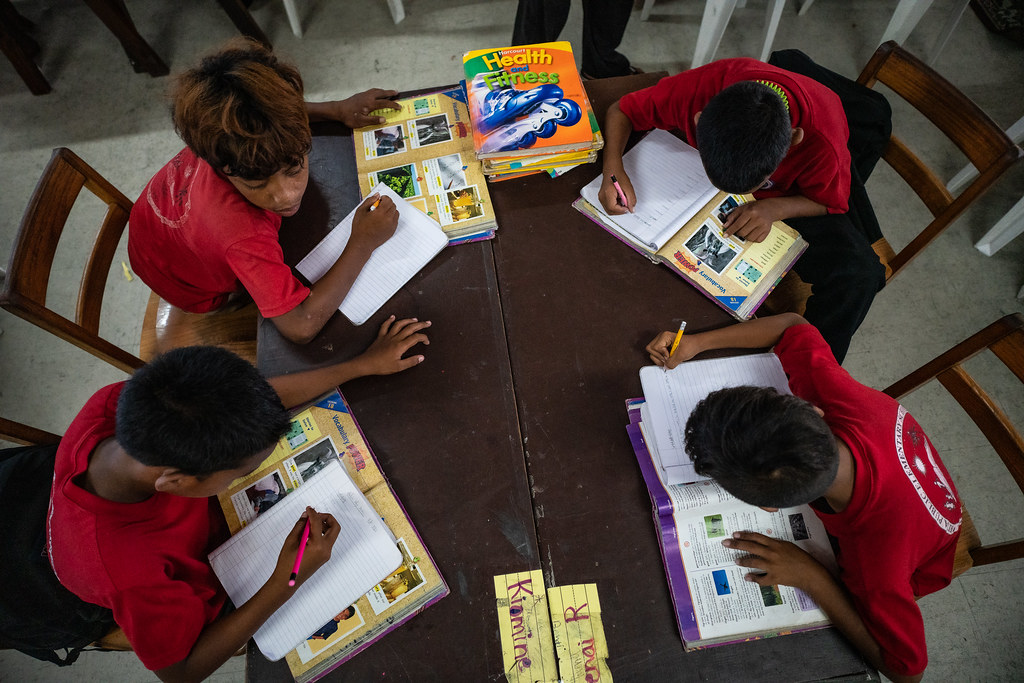RMI Education and Skills Strengthening Project
The Government of the Republic of Marshall Islands has gotten financing from the World Bank for the Education and Skills Strengthening Project (ESSP) cost. It intends to apply part of the earnings for consulting services.
The consulting services ("the Services") will help the Project Manager and the RMI National Training Council in implementing the World Bank-funded project efficiently.
The assignment will focus on supporting the Project Implementation Unit (PIU) in producing a structure for Recognition of Prior Learning (RPL) for TVET, aimed at helping the College of the Marshall Islands and the RMI National Training Council examine and enhance the abilities of employees through certified college accreditation.
The in-depth Terms of Reference (TOR) for the project are shown in the connected Terms of Reference (ToR).
The National Training Council now welcomes eligible individuals ("Consultants") to suggest their interest in supplying the Services. Intrigued Consultants need to provide information demonstrating that they have actually the required credentials and relevant experience to carry out the Services (connect a Cover Letter of no more than 4 (4) pages attending to the necessary experience and certification requirements curriculum vitae with a description of experience in comparable projects, comparable conditions, and so on). Companies' staff might express interest through the utilizing firm for the assignment. In such a scenario, only the experience and qualifications of people shall be considered in the selection process. The criteria for choosing the Consultant are: A.
Mandatory Qualifications and Experience Master's degree in education, training
, management, or a related field. Minimum of 5-10 years of experience working in TVET System. Curriculum Design and Systems.
Have 2-5 years' experience designing and
implementing RPL. structures, policies, and procedures. A sample of previous work will be required as proof of previous experience. Exceptional communication, training, and assistance
abilities. Experience with working with varied stakeholders, including government. firms, TVET institutions, employers, and students in the Pacific. B. Desired Qualifications and Experience Ability to deal sensitively in a multicultural
environment and develop efficient group relationships with customers and appropriate stakeholders. The attention of interested Consultants (including firms )is drawn to paragraphs 3.14, 3.16 and 3.17 of the World Bank's"

Procurement Regulations for IPF Borrowers "July 2016 modified November 2020" Procurement Regulations ", stating the World Bank's policy on conflict of interest. Additional info can be obtained at the address below throughout workplace hours, 0900 to 1700 local time. Expressions of interest need to be
delivered in a written type to the address listed below (face to face or by e-mail )by 5:00 pm, 23rd December 2024.
The subject line must state:"National Training Council Strategic Plan Consultant -complete name of the prospect". Julius Lucky Director National Training [email protected]:Phone: 692 625-4521 Empowering Community Champions for Sustainable Development in RMI Gender Equality, Climate Resilience and Water Safety Training Majuro,
Republic of the Marshall Islands: The 4th
Women and Youth Training for
Gender Equality, Climate Change, Disaster Risk Reduction and Water Safety Management has just recently occurred at the University of the South Pacific's campus in Majuro, the Republic of the Marshall Islands(rmi national training council ). This important training was organized by the United Nations Development Programme( UNDP )Pacific Office through the Addressing Climate Vulnerability in the Water Sector(ACWA) project. The week-long capacity-building training aimed to empower women and youth with the understanding and practices required for climate-resilient water safety management in the
Republic of the Marshall Islands(RMI ). This training enhances a dedication to boosting RMI's water security and community durability against climate modification impacts, especially ladies
and youth, making sure that nobody is left behind. The training invited participants from all 24 atolls and included resource speakers from government agencies, non-governmental organizations, and global advancement partners from the rmi national training council Environmental Protection Authority, Climate Change Directorate, Office of the Chief Secretary, Ministry of Culture and Internal Affairs, National Disaster Management Office, Women United Together Marshall Islands, RMI Human Trafficking Task Force, Waan Aelõñ in Majel, Jo-Jikum, and the International Organization for Migration. In her opening remarks, Secretary for the Ministry of Culture and Internal Affairs, Brenda Alik, highlighted the significance of cumulative action in constructing a climate-resilient country."It is our duty to come together and collaborate. As we deal with the challenges presented by climate modification, understanding its influence on our water resources is necessary for enhancing the wellness of neighborhoods across the Marshall Islands,"she said.
RMI Environmental Protection Authority General Manager Moriana Philip highlighted in her speech the essential function of females and youth in dealing with climate-related challenges."This workshop unifies us from various communities to resolve the pressing issues we face today, including climate-related difficulties, especially on our water resources."We wish to stress the crucial function of females and youth in this job as your participation is instrumental to its success and beyond, "she stated.
The very first day of the workshop covered vital concerns associated with gender equality, human rights, and public health within the Marshall Islands. It included conversations on gender equality and mainstreaming, focusing on the effects of environment change on water security and the disproportionate effects on vulnerable groups. The significance of incorporating gender equality and social addition into all job aspects was also talked about. Human rights and human trafficking were dealt with, worrying the requirement for comprehensive defense of vulnerable populations
during emergencies. Additionally, the workshop addressed gender-based violence, highlighting the various types that can emerge in disaster situations, such as domestic violence and sexual coercion. The agenda concluded with a focus on sanitation and health and their important role in health, livelihoods, school presence, dignity, and building resilient neighborhoods. ACWA Project Manager Koji Kumamaru expressed his gratitude to all participants
, emphasizing the value of their contributions to their communities."Women and youth are crucial to the success of the ACWA project. More notably, you are the champions and future leaders who will return to your communities to empower others,"he said. Throughout the workshop, individuals visited Rongrong Island and examined the 15,000-gallon Flatpack Modular water tank set up at the Rongrong High School Boys Dormitory as part of the ACWA task. The installation is an essential part of the project, complemented by assistance from Australia
's Department of Foreign Affairs and Trade. The visit functioned as a valuable firsthand experience of the favorable effect of the ACWA project on the community and its
water resources. Marie Naisher from Jabat Island revealed her gratitude for the opportunity to join the workshop and made clear her desire to be part of the job when it reaches Jabat.
"This was my very first time participating in such training, and I discovered so much from the guest speakers, group activities, and the site see. I now understand the importance of clean water and how to sterilize it. I'm thrilled about the ACWA job pertaining to Jabat and ready to assist when it shows up,"she stated. Don Kobney, an ACWA website coordinator from Santo, Kwajalein, also shared his excitement."The workshop and site go to improved my confidence and understanding of the water tank installation.
Seeing the 15,000-gallon flatpack modular water tank firsthand offered me a clear understanding of the system, and I'm eagerly anticipating sharing this understanding with my neighborhood, "he said. By the workshop's end, participants were better geared up to understand climate modification and its regional effects, drive adaptation and mitigation efforts, especially in water safety, and make use of new resources to affect their neighborhoods positively. ACWA is made possible thanks to the support of the Green Climate
Fund, with the task co-financed by the Government of the Republic of the Marshall Islands
. The Marshall Islands: Skills Training and Vocational Education Project Examines the efficiency of the job and highlights lessons. Offers inputs to 2 wider evaluations- the local assessment of ADB support for the Pacific and the special assessment study on Millennium Development Goals. The low academic attainment and lack of Marshallese skilled workers were mostly due to the low quality of fundamental education, lack of access to education in the external islands, and weaknesses in abilities training and the trade and technical education system.
These supported an economy marked by high unemployment because of constrained private sector growth and federal government downsizing. Unemployment was specifically high amongst the youth and females in the outer islands. Suitable local proficient personnel for existing job vacancies
were not available, hence the importation of appropriately knowledgeable foreign workers. Thus, there was a mismatch between readily available tasks and abilities of the Marshallese labour force. These conditions provided the initiative for the Government
of the Marshall Islands to focus on technical and trade education training reforms. In 2000, ADB authorized a loan for $9.1 million to enhance skills training to provide well-trained workers required for sustained financial and social development. This was to be accomplished through an integrated national abilities training system. The project included 4 components: development of a profession awareness program, abilities training enhancement, boosted skills training chances for women and youth, and institutional conditioning. The expected result was increased income-generating chances and work for students, particularly ladies and youth in the external islands. In general, the project was ranked unsuccessful. Minimal progress was achieved in making the task responsive to the requirements of its recipients and private-sector employers. The long-standing weakness of poor numeracy and literacy proficiencies
among public primary and secondary school graduates and dropouts getting in college or participating in voc-tech education could be partially attributed to the poor quality of fundamental education. The task was supply-driven and might not develop a strong linkage with economic sector requirements or align its activities with the requirements of the labour market. The status of the technical and trade education training system has remained fundamentally the exact same after task conclusion. The study put forward that ADB could encourage the Government of the Marshall Islands, through assessment and policy discussion, to follow through on the federal government's
commitment to establishing a dedicated labour details system to connect technical and vocational education training program offerings with market need. Although the project established a labour market information system, in the lack of internal staff capability at the National Training Council, it was not completely operational.








